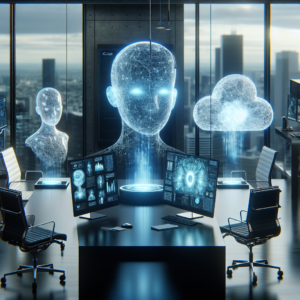Why Did Microsoft Admit That AI Is Making Us Dumb?
In recent discussions surrounding artificial intelligence (AI), a striking remark from Microsoft has caught the attention of both tech enthusiasts and casual users alike: the tech giant has openly acknowledged that AI could potentially be making us less intelligent. This admission raises important questions about the impact of AI technologies on our cognitive abilities, and it demands a deeper examination of how our reliance on AI is reshaping the ways we think, learn, and interact with the world.
The Rise of AI: A Double-Edged Sword
Artificial intelligence has rapidly evolved from a niche technology to a ubiquitous presence in our daily lives. From voice-activated assistants like Siri and Alexa to recommendation algorithms on streaming platforms, AI is embedded in many aspects of our digital experiences. While these advancements undoubtedly offer convenience and efficiency, they also prompt concerns about dependency.
Convenience vs. Cognitive Engagement
One of the most significant advantages of AI is its ability to streamline tasks that once required significant mental effort. For instance, consider the ease with which we can now access information. Instead of engaging in rigorous research, individuals often turn to search engines to retrieve data within seconds. This convenience comes at a cost; our cognitive engagement diminishes as we rely on AI to do the heavy lifting for us.
Moreover, the act of critical thinking—an essential skill in problem-solving and decision-making—is often compromised. When AI becomes the default source of knowledge, we may find ourselves less inclined to question, analyze, or even verify the information presented to us. The tendency to accept AI-generated content without scrutiny may lead to superficial understanding rather than deep learning.
Memory and Retention: A Diminishing Art
Another area where AI’s influence is apparent is in our memory retention. With digital assistants capable of storing reminders, important dates, and even entire conversations, the need for personal memory recall has significantly decreased. While this can alleviate stress and help us manage our busy lives, it also raises concerns about the long-term implications on our cognitive abilities.
Studies have shown that relying heavily on technology for memory can lead to a decline in our capacity to remember information independently. This phenomenon, often referred to as “digital amnesia,” underscores the need for a balanced approach to technology use. By outsourcing our memory tasks to AI, we risk dulling our mental faculties and impairing our ability to retain critical information.
The Social Dimension of AI: Communication and Connection
The influence of AI extends beyond individual cognition; it also impacts our social interactions. As AI-driven communication tools become more sophisticated, they change how we engage with one another. While these technologies can facilitate connections, they also present challenges to genuine human interaction.
The Illusion of Connection
Platforms like social media leverage AI algorithms to curate content, suggesting friends and connections based on our online behavior. While this creates a sense of community, it can lead to an illusion of connection where meaningful relationships take a backseat to superficial interactions. The art of conversation—listening actively, empathizing, and engaging in deep discussions—may be overshadowed by the ease of quick exchanges facilitated by AI.
Furthermore, as AI chatbots and virtual assistants take over customer service roles, the nuances of human communication may be lost. The emotional intelligence inherent in human interactions cannot be replicated by AI, which often struggles to understand context, tone, and emotional cues. This shift raises a critical question: are we sacrificing the depth of our relationships for the efficiency offered by AI?
Education and Learning: A New Paradigm
The use of AI in education presents another domain where the potential for cognitive decline is evident. While AI can provide personalized learning experiences and instant feedback, it also poses the risk of fostering a passive learning environment. Students might rely on AI for answers rather than engaging with the material and grappling with challenging concepts.
Education is not just about acquiring knowledge; it’s also about developing critical thinking skills and the ability to navigate complexity. If students become accustomed to having AI deliver solutions, they may miss out on the essential process of inquiry, experimentation, and self-discovery that characterizes effective learning.
A Call for Balance: Navigating the AI Landscape
As we navigate this evolving landscape of AI technology, it is imperative to strike a balance between leveraging its benefits and maintaining our cognitive independence. Microsoft’s acknowledgment serves as a wake-up call, urging us to reflect on our relationship with technology and its impact on our intelligence and social fabric.
Emphasizing Critical Thinking
One way to mitigate the risks associated with AI dependence is to prioritize critical thinking in our daily lives. This can be achieved by fostering a mindset that questions information sources, engages in meaningful discussions, and values independent thought. Educational institutions, employers, and individuals can all play a role in promoting critical thinking as an essential skill for navigating an AI-driven world.
Incorporating AI responsibly into learning environments is also vital. While technologies can complement education, it is essential to encourage active participation and engagement with content. Hands-on experiences, collaborative projects, and interactive discussions can help counteract the passive learning tendencies that AI might induce.
Encouraging Human Connections
To combat the erosion of genuine human interactions, we must consciously prioritize face-to-face communication and authentic relationships. Setting aside time for in-person conversations, fostering empathy, and honing emotional intelligence are essential for maintaining meaningful connections in a world increasingly dominated by AI-mediated interactions.
Additionally, it is crucial to advocate for ethical AI development practices that prioritize human well-being. By encouraging a future where AI serves as an enhancement to human capabilities rather than a replacement, we can ensure that technology supports our growth rather than stifles it.
Conclusion: Navigating the Future of AI and Intelligence
Microsoft’s admission that AI may be making us less intelligent is a poignant reminder of the dual nature of technology. While AI offers unprecedented conveniences and efficiencies, it also poses risks to our cognitive abilities, social interactions, and educational experiences. To navigate this complex landscape, we must adopt a proactive approach that emphasizes critical thinking, genuine connections, and responsible use of technology.
Ultimately, the goal should not be to abandon AI but to leverage its potential while preserving our capacity for independent thought and meaningful relationships. By doing so, we can embrace a future where AI complements our intelligence rather than diminishes it, allowing us to thrive in an increasingly digital world.



